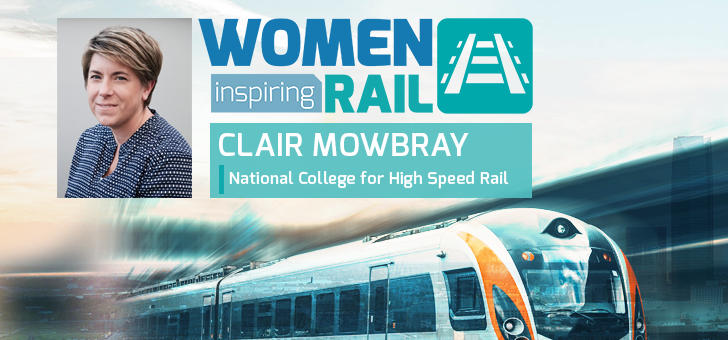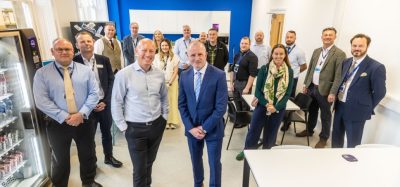Women Inspiring Rail: A Q&A with Clair Mowbray, Chief Executive, National College for High Speed Rail
Posted: 24 July 2019 | Clair Mowbray | No comments yet
For the latest instalment in Global Railway Review’s Women Inspiring Rail series, we spoke to Clair Mowbray, Chief Executive, National College for High Speed Rail (NCHSR), who tells us it is not just diversity among employees that needs to change, but the training frameworks too.


How did your career in rail begin and what does your current job involve?
I began by getting involved with High Speed Two (HS2), where I started work back in November 2014. There was an advisory group established, which was led by Sir Terry Morgan (former Chairman for Crossrail and HS2) and it was seeking a Project Manager to take the lead in setting up the National College for High Speed Rail. I already had strong project management experience because I’d been running my own business and I’d worked within the further education and higher education sectors throughout the majority of my career.
A large part of the last five years has been working with stakeholders to achieve buy-in and support for the college. I’ve been going out and talking to businesses; understanding what their needs are, what the biggest challenges they face around skills are, and how they would like to see skills provisions being delivered. Through that process, I’ve built knowledge and understanding of the sector and had an opportunity to bring a fresh perspective.
With overall responsibility for leading our growing team across two sites in Birmingham and Doncaster, we’re continuing to find and develop new training solutions that will work for a large number of companies in the rail and transport sector. The college is currently diversifying into the wider transport sector and developing its curriculum which is based around Level 4 and 5 apprenticeships and full-time courses, right through to Level 6 and short CPD courses. As we continue this work, I’m hearing about all kinds of future developments and I’m excited about the direction of this industry.
What aspects of your job do you find the most challenging/rewarding, and why?
The most rewarding aspect of this job is seeing the journey that our learners and apprentices take as they train and learn with the college. It’s especially rewarding to see our full-time learners coming through the doors and then either taking up an apprenticeship or graduating. Many of our learners come from disadvantaged backgrounds so it’s about giving them new opportunities and ensuring they have the skills and confidence to begin a career in the sector.
The greatest challenge we face is probably in terms of our operating environment at a political level. While the college’s purpose is to work with businesses and the Government to provide the higher-level skills required for major transport infrastructure projects, we operate as a separate entity. No matter what is happening at a political level, we always remain focused on our key purpose to champion and deliver skills for a growing sector.
What is it about the rail industry that you are most passionate about?
Our goal is to help diversify and modernise the industry so that rail and broader transport infrastructure projects can adopt new technologies and reach their full potential.
I’m passionate about the future of transport infrastructure and helping the broader sector to evolve its workforce by upskilling and attracting new entrants. Enabling people to make a step change is the real opportunity for us at the National College for High Speed Rail. It’s an exciting aspect whether we’re supporting high-speed rail developments or more conventional rail projects such as Network Rail’s CP6 programme. Our goal is to help diversify and modernise the industry so that rail and broader transport infrastructure projects can adopt new technologies and reach their full potential.
What has been your biggest achievement/proudest moment so far in your rail career?
Our launch has definitely been my proudest moment to date. We’ve created a brand new college, from a standing start and while there have been some inevitable challenges in doing so, we’re very excited about our future direction. The college is committed to its original principles as a truly industry-focused institution. Meanwhile, the industry now has an opportunity to work with us and to shape and steer where we go next in order to train the next generation.
How has the rail industry evolved since you joined? What have been the biggest changes?
So much has happened over the past few years, with the development of regional transport bodies such as Transport for the North (TfN) and Midlands Connect, which are now making the case for transformative transport projects across their respective regions. HS2 has also moved from planning to development with the work on Phase One now underway following its parliamentary approval.
The biggest change, however, has probably been the development of a strong post-HS2 vision. We’re now also supporting exciting plans like Northern Powerhouse Rail (NPR) which will dramatically enhance East-West connections if it goes ahead. Alongside Network’s Rail’s development plans for the existing UK network, both HS2 and NPR now present new opportunities to look at the broader skills challenges within the workforce and bring together like-minded bodies to address them.
Who within the rail community has been an inspiration to you, and why?
Adeline Ginn – the Founder of Women in Rail – has been a huge inspiration for me. The passion and the energy she brings by championing women in the rail sector is unrivalled. She seems to have endless energy and a willingness to look at new and different ways to give women support to develop their careers within the rail sector. Adeline hasn’t just limited herself to her day job and is committed to driving Women in Rail forward. She is a member of a range of other boards that are also helping to give women a voice in the industry too.
What can be done to diversify the workforce in the rail sector? What advice would you give to those thinking about pursuing a career in rail?
To diversify we need to reflect not just on recruitment practices, but also working practices and what can be changed within the industry itself to attract a much broader audience.
To diversify we need to reflect not just on recruitment practices, but also working practices and what can be changed within the industry itself to attract a much broader audience. We need to make sure that working practices are appealing and that we don’t typecast people and force them into specific roles. There is a breadth of opportunity in the rail industry but this is not necessarily limited to rail and should be seen in the wider context of the transport industry.
For anyone wanting to join the rail industry I would advise that they start building a network across a wider variety of companies so that they can gain the broadest possible understanding of the range of opportunities and career paths. Organisations like Young Rail Professionals provide a really good network to get support, advice and industry knowledge.
If you would like to take part in the Women Inspiring Rail series, or would like to nominate a colleague to part, please email: Craig Waters, Editor, Global Railway Review.
Related topics
Related organisations
Crossrail Ltd, Midlands Connect, Network Rail, Transport for the North (TfN)







